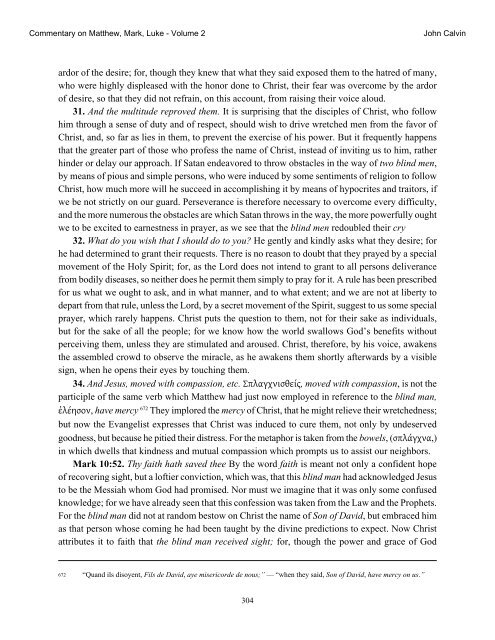Commentary on Matthew, Mark, Luke - Volume 2.pdf
Commentary on Matthew, Mark, Luke - Volume 2.pdf
Commentary on Matthew, Mark, Luke - Volume 2.pdf
Create successful ePaper yourself
Turn your PDF publications into a flip-book with our unique Google optimized e-Paper software.
<str<strong>on</strong>g>Commentary</str<strong>on</strong>g> <strong>on</strong> <strong>Matthew</strong>, <strong>Mark</strong>, <strong>Luke</strong> - <strong>Volume</strong> 2<br />
ardor of the desire; for, though they knew that what they said exposed them to the hatred of many,<br />
who were highly displeased with the h<strong>on</strong>or d<strong>on</strong>e to Christ, their fear was overcome by the ardor<br />
of desire, so that they did not refrain, <strong>on</strong> this account, from raising their voice aloud.<br />
31. And the multitude reproved them. It is surprising that the disciples of Christ, who follow<br />
him through a sense of duty and of respect, should wish to drive wretched men from the favor of<br />
Christ, and, so far as lies in them, to prevent the exercise of his power. But it frequently happens<br />
that the greater part of those who profess the name of Christ, instead of inviting us to him, rather<br />
hinder or delay our approach. If Satan endeavored to throw obstacles in the way of two blind men,<br />
by means of pious and simple pers<strong>on</strong>s, who were induced by some sentiments of religi<strong>on</strong> to follow<br />
Christ, how much more will he succeed in accomplishing it by means of hypocrites and traitors, if<br />
we be not strictly <strong>on</strong> our guard. Perseverance is therefore necessary to overcome every difficulty,<br />
and the more numerous the obstacles are which Satan throws in the way, the more powerfully ought<br />
we to be excited to earnestness in prayer, as we see that the blind men redoubled their cry<br />
32. What do you wish that I should do to you? He gently and kindly asks what they desire; for<br />
he had determined to grant their requests. There is no reas<strong>on</strong> to doubt that they prayed by a special<br />
movement of the Holy Spirit; for, as the Lord does not intend to grant to all pers<strong>on</strong>s deliverance<br />
from bodily diseases, so neither does he permit them simply to pray for it. A rule has been prescribed<br />
for us what we ought to ask, and in what manner, and to what extent; and we are not at liberty to<br />
depart from that rule, unless the Lord, by a secret movement of the Spirit, suggest to us some special<br />
prayer, which rarely happens. Christ puts the questi<strong>on</strong> to them, not for their sake as individuals,<br />
but for the sake of all the people; for we know how the world swallows God’s benefits without<br />
perceiving them, unless they are stimulated and aroused. Christ, therefore, by his voice, awakens<br />
the assembled crowd to observe the miracle, as he awakens them shortly afterwards by a visible<br />
sign, when he opens their eyes by touching them.<br />
34. And Jesus, moved with compassi<strong>on</strong>, etc. Σπλαγχνισθείς, moved with compassi<strong>on</strong>, is not the<br />
participle of the same verb which <strong>Matthew</strong> had just now employed in reference to the blind man,<br />
ἐλέησον, have mercy 672 They implored the mercy of Christ, that he might relieve their wretchedness;<br />
but now the Evangelist expresses that Christ was induced to cure them, not <strong>on</strong>ly by undeserved<br />
goodness, but because he pitied their distress. For the metaphor is taken from the bowels, (σπλάγχνα,)<br />
in which dwells that kindness and mutual compassi<strong>on</strong> which prompts us to assist our neighbors.<br />
<strong>Mark</strong> 10:52. Thy faith hath saved thee By the word faith is meant not <strong>on</strong>ly a c<strong>on</strong>fident hope<br />
of recovering sight, but a loftier c<strong>on</strong>victi<strong>on</strong>, which was, that this blind man had acknowledged Jesus<br />
to be the Messiah whom God had promised. Nor must we imagine that it was <strong>on</strong>ly some c<strong>on</strong>fused<br />
knowledge; for we have already seen that this c<strong>on</strong>fessi<strong>on</strong> was taken from the Law and the Prophets.<br />
For the blind man did not at random bestow <strong>on</strong> Christ the name of S<strong>on</strong> of David, but embraced him<br />
as that pers<strong>on</strong> whose coming he had been taught by the divine predicti<strong>on</strong>s to expect. Now Christ<br />
attributes it to faith that the blind man received sight; for, though the power and grace of God<br />
672 “Quand ils disoyent, Fils de David, aye misericorde de nous;” — “when they said, S<strong>on</strong> of David, have mercy <strong>on</strong> us.”<br />
304<br />
John Calvin

















